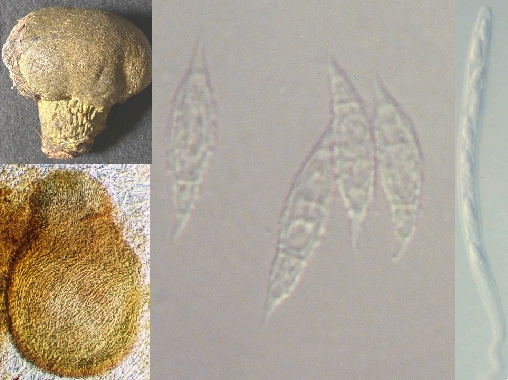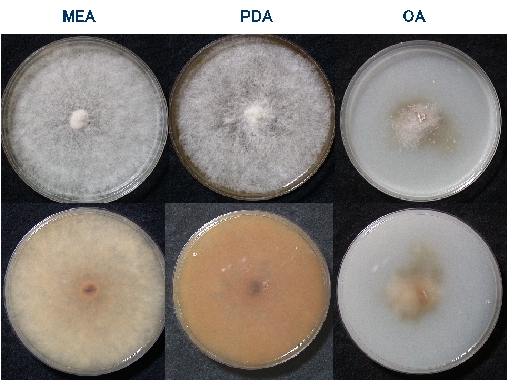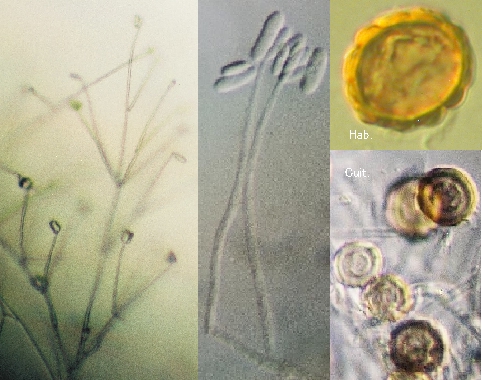



Teleomorph
in nature: Subiculum effuse, olive brown(Munsell 5Y6/2) to olive(5Y7/2), grayish
yellow(5Y7/6), covering entire surface of hymenium;
hymenial hyphae 3-5.5μm in widt,
parenchymatous, septate, thick-walled and KOH (-). Perithecia olive
brown,(5Y5/4)to olive(10Y4/2), obpyriform to broadly
ellipsoidal, (230-)265-280(-310)×(230-)280-310(-330) μm, born in groups immersed in the mycelia; papilla conical, (100-)120-130(-145)×(100-)145-185(-200) μm. Asci cylindrical, (120-)136-157(-171)×(4.5-)5.5-6.5(-8) mm, eightspored with a stalk (22.5-)25.5-27 (-32) μm long, forming a
pore at the slightly thick-walled apex. Ascospores
hyaline, fusiform, aseptate, (24-)27-29 (-35)×5-5.5(-7) μm, verrucose with warts of <0.5 mm in diameter, apiculate but
sharp-angled at both ends; apiculi 2.5-3 μm long.
Characteristics
in culture: Colonies on MEA, grow rapidly to reach 10?15 mm in diameter. after 7 days at 25oC, floccose, grayish yellow(5Y8/2) to birch
gray(10YR7/2), margins dentate, odor none, reverse grayish
brown(10YR6/2) to brownish orange(10YR7/4). Hyphae are hyaline, septate, thick-walled, 3-5.5(-11) μm. Conidiophores
born from aerial hyphae, semi-macronematous, septate, slightly thick-walled,
two to three times branched irregularly, 3-3.5(-5) μm wide, forming conidiogenous cells at the apex.
Conidiogenous cells born laterally or as a main branch of conidiophores,
solitary or in a well-developed verticil of 2-5 on the conidiophores, hyaline, (17.5-)53-75 (-145)×(1.5-)2.5-3.5 μm, lanceolate, gradually tapered to the apex of 1-2 (-2.5) μm in width. Conidia solitary to clusters from the apex of
conidiogenous cells, hyaline, aseptate, cylindrical to long ellipsoidal, thin-walled,
smooth, (5.5-)11-13 (-21)×(2-)3-5 μm. Chlamydospores produced laterally on the substrate hyphae
or terminally at the apex of the branches, grayish brown(10YR5/2) to
birch gray(10YR7/2), verrucose, globose, 9-13(-17.5) μm in width.
Habitat:
parasitic on Tylopilus valens (Corner) Hongo &
Nagas.
References
Tokiwa T, Okuda T (2009) Japanese species of Hypomyces
and their anamorphs IV. Nippon Kingakukai Kaiho 50: 94-103 (in Japanese)